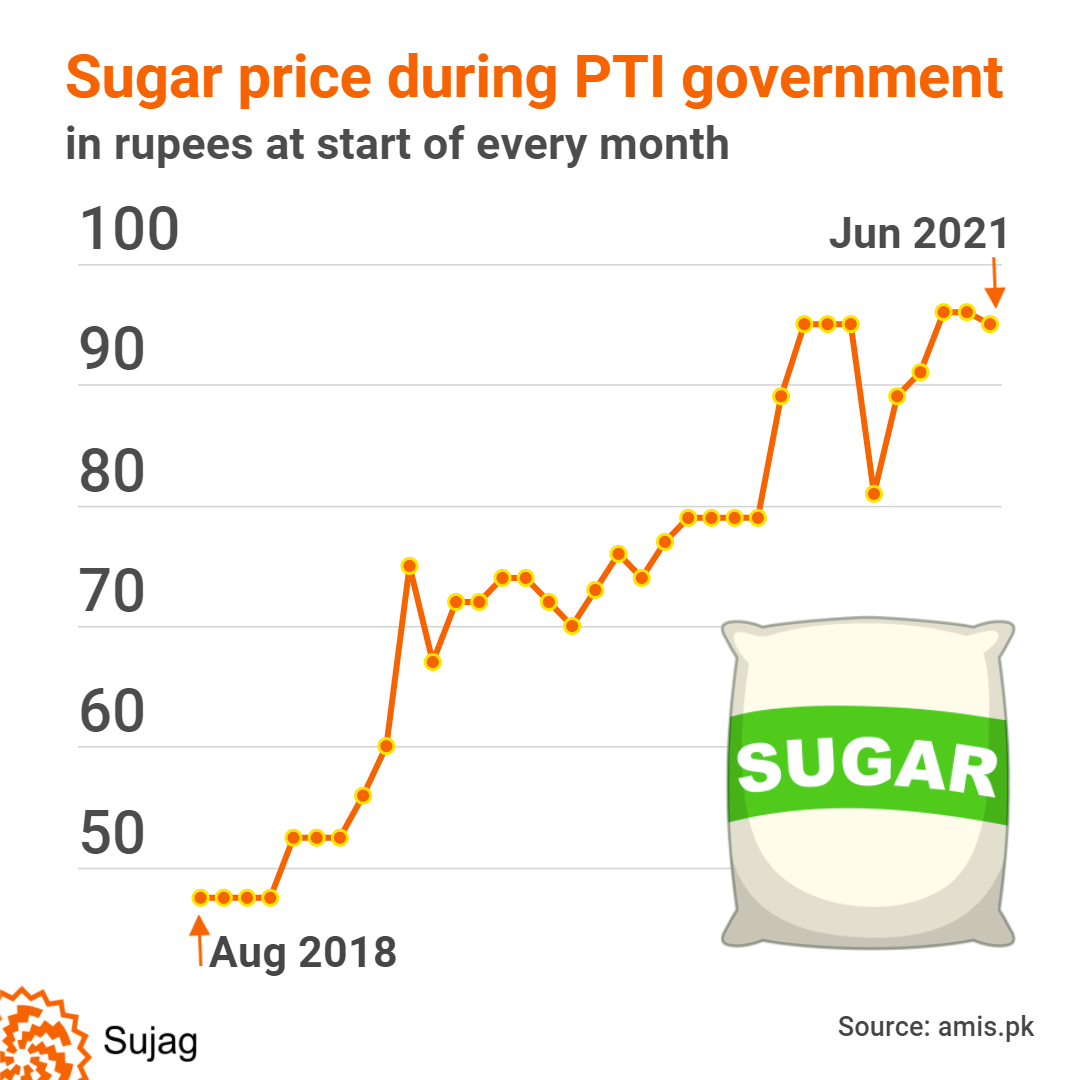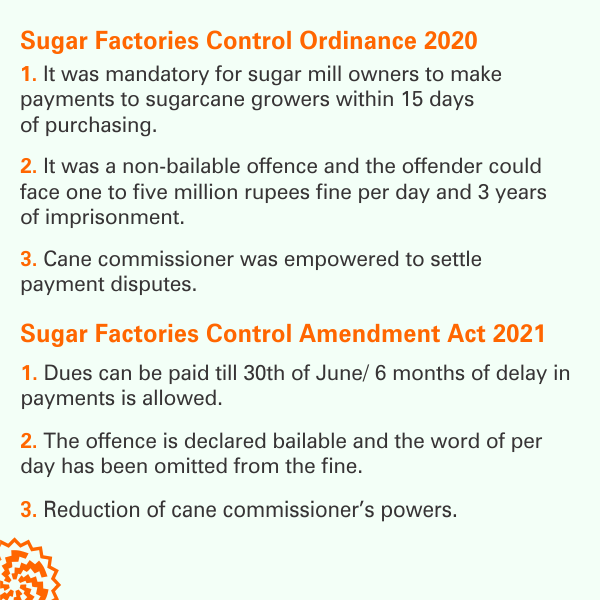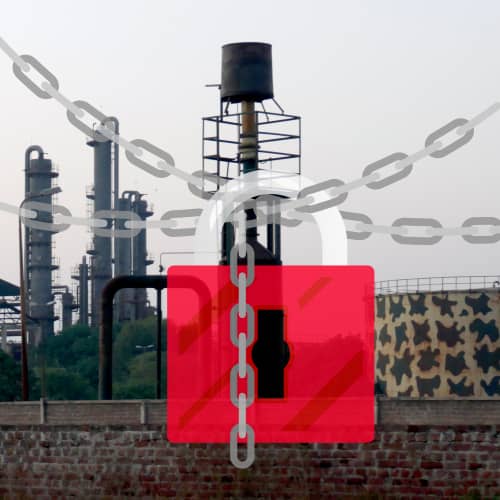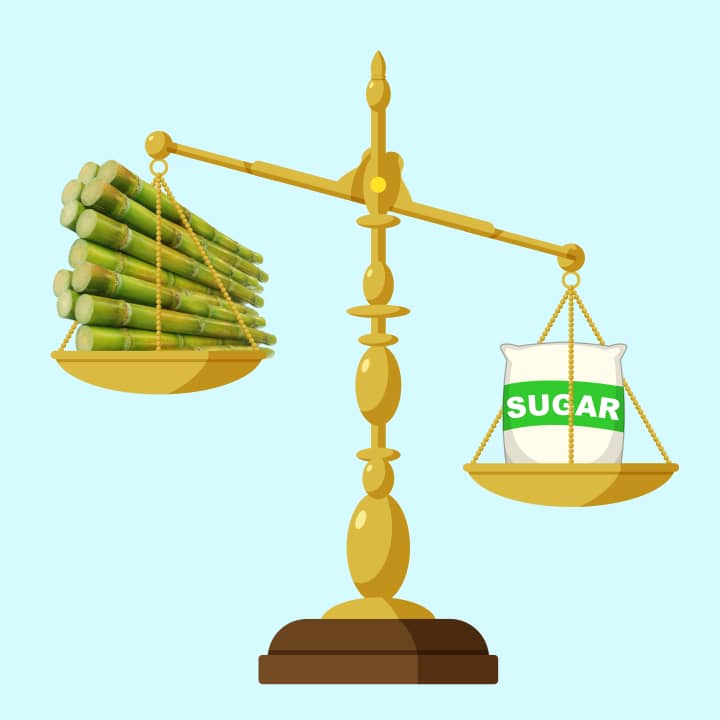Punjab Assembly recently passed a law that not only embarrassed the ruling party legislators but also forced the government to withdraw it.
The controversial law, titled as the Sugar Factories Control Amendment Act 2021, was passed on 4th May 2021. It did not include the ‘Notice of Crushing’ which was provided for in the Sugar Factories Control Act of 1950 and which required sugar mill owners to notify to the provincial cane commissioner in writing as to when they would begin the process of crushing sugarcane. (The new law, however, set November 30 as the deadline for the start of crushing season – just as the 1950 Act did.)
The new law also changed the status of sugarcane purchase receipts (CPRs). An earlier law required mill owners to deposit the money mentioned on CPRs in banks wherefrom sugarcane growers could withdraw it in 15 days by showing their CPRs. In other words, a CPR was equivalent to a bank cheque. The new law did mention CPRs but did not specify as to how the amount written on them was to be paid to sugarcane growers.
Violation of the new law, like that of the previous ones, was deemed punishable by up to three years in prison but it was declared a bail-able offense and the police’s power to arrest the offenders was also taken away.
As soon as this law was passed, Punjab’s agriculture minister Syed Hussain Jahanian Gardezi expressed his dissatisfaction with it. In a press conference, he said it was not the law drafted and sent by his department to the assembly for approval. He alleged that some people had secretly and illegally changed that draft and got the changed draft approved by the assembly. He also vowed the Punjab government would investigate the matter thoroughly and publicize the names of those involved in it.
Prime Minister Imran Khan also reacted strongly to the passage of the law. During a recent meeting with a delegation of farmers in Islamabad, he admitted that sudden changes in the draft were made in the dark of the night.
Punjab Assembly’s opposition members say the day the law was passed was reserved as a Private Members’ Day. Assembly’s members, therefore, could only present laws drafted by them as individuals and not those drafted by the government.

Hassan Murtaza, parliamentary leader of Pakistan Peoples Party (PPP), says the opposition members were also not present in the assembly when the law was passed. They had already walked out in protest against the government policies, he says.
On the other hand, many ruling party members of the assembly say they were not given the copies of the law before it was passed. They claim only three copies of it were available in the assembly: The speaker had one and the law minister had the other while the third was meant to be sent to the governor for his signature after the passage of the law.
Some other treasury members say more than a dozen laws were passed that day but the legislators were not given enough time to read even one of them.
Mussarat Jamshed, a member of the Punjab Assembly belonging to the ruling Pakistan Tehreek-e-Insaf (PTI) says she is embarrassed by the way the law has been passed since, according to her, it violated the assembly’s rules of business in order to protect the interests of sugar mill owners. She alleges the disappearance of the opposition from the assembly while the law was being tabled was also a part of the plan for its passage because, as she puts it, “all the political parties otherwise bent upon killing each other fall in line when it comes to protecting the interests of sugar mill owners”.
Another PTI politician expresses similar views. Politics in Punjab in general and the southern districts of the province in particular -- including his own district of Rahim Yar Khan – has been in the control of sugar mill owners for quite some time, he says on the condition of anonymity. “Party tickets for contesting elections here are also distributed at the pleasures of these mill owners,” he says.
Prominent among them are former prime minister Nawaz Sharif and former Punjab chief minister Shahbaz Sharif from Pakistan Muslim League-Nawaz (PMLN), former chief minister and incumbent speaker Punjab Assembly Pervez Elahi from Pakistan Muslim League-Quaid-e-Azam(PMLQ), federal minister Makhdoom Khusro Bakhtiar and former federal ministers Jahangir Tareen and Humayun Akhtar Khan from PTI and former Punjab governor and PPP leader Makhdoom Ahmad Mahmood.
Since top leaders of all the major parties have shares in sugar mills, says the PTI politician, it is not difficult for them to have a law passed in their favor in a secret and dubious manner.
From a committee to an ordinance
Sugar prices started rising after PTI came into power three years ago. Its price was 55 rupees per kilogram in November 2018 but it was selling at 80 rupees per kilogram in February 2020.

After this change elicited a strong public reaction, Prime Minister Imran Khan set up an inquiry committee comprising senior officials of the Federal Investigation Agency (FIA) to find out reasons for the price hike. Talking to a delegation of farmers recently, Khan said the “sugar mafia” threatened him as soon as the committee started its investigation that, if it continued its work, they will make sugar disappear to push its prices even higher.
The investigation, nevertheless, went on and the committee’s report came to light in July 2020. Among other things, it identified methods used by mill owners to exploit both sugarcane growers and sugar consumers. It also recommended that some changes in the Sugar Factories Control Act 1950 were necessary to curb this exploitation.
When the report was presented to the prime minister, he directed the Punjab government to make these changes. He, however, soon found out that the provincial government was reluctant to act on his advice so he decided to implement the proposed changes through an ordinance.
To implement this decision, Punjab Governor Chaudhry Muhammad Sarwar issued an ordinance on 24th September 2020 which declared it to be a crime to issue informal paper receipts instead of PCRs for sugarcane purchased from farmers. Similarly, any mill owner or mill employee who delayed the payment for the purchased sugarcane or made illegal deductions in its weight and price was to be given a three-year imprisonment or slapped and fine of five million rupees.
Making some additions in the Sugar Factories Control Act 1950, the ordinance made it mandatory for sugar mill owners to make payments to sugarcane growers within 15 days of purchasing sugarcane from them. If and when a dispute arose over payments, the cane commissioner was empowered to settle it.
Another important change made by the ordinance was about its violation. Under the Sugar Factories Control Act 1950, such violation was a cognizable offense, giving the police the power to arrest the offender, but the law also gave the offender the right to seek bail before arrest. Under the ordinance, the violation was declared a non-bail-able offense and the sentence for it was also increased from one year imprisonment to three years in jail or a fine of one million to five million rupees. Repeat offenders were to be fined five million rupees a day for the entire period when they had violated the law.
Mahmood-ul-Haq Bukhari, chairman of the All Pakistan Farmers Foundation, says that, in 2020-21 season, sugarcane growers could largely avoid deduction that mill owners usually made while buying their crop. This was mainly because of the presence of the ordinance and an active role played by Punjab’s cane commissioner in its enforcement, he says. “Due to the ordinance, sugarcane farmers got an additional income of about 100 billion rupees.”
A legislation or a fraud?
Constitutionally, an ordinance can only be in force for three months. After that period expires, its validity can be extended only once for another three months. Due to these constitutional constraints, the Sugar Factories Control Ordinance expired on 23rd March 2021.
If the provincial government had so desired, it could have then turned the ordinance into a law passed by the provincial assembly. Instead, it presented another draft containing new amendments to the Sugar Factories Control Act 1950 to Speaker Pervez Elahi who then referred it for further consideration to a committee headed by provincial law minister Raja Basharat.
This committee also includes Sajid Ahmed Bhatti and Khadija Umar of PMLQ, Mian Muhammad Shafi and Sameera Ahmed of PTI, Samiullah Khan, Malik Muhammad Ahmed Khan and Khalil Tahir Sindhu of PMLN, Raees Nabil Ahmed of PPP and Muhammad Muaviyah Azam of Rah-e-Haq Party.
Some lawmakers and farmer leaders say it was a wrong decision by the speaker to send the draft law to this committee because, according to the assembly’s rules of business, he should have sent it either to the committee on agriculture or to the one of food. These critics also point out that the committee tasked by the speaker to consider the draft includes two members of his own party (Sajid Ahmed Bhatti and Khadija Omar). Similarly, although Raja Basharat belongs to PTI, he and Pervez Elahi have a long-standing political and personal relationship spanning over more than two decades. Two other members of the committee come from Rahim Yar Khan district where sugar mill owners wield significant political influence.
Also Read

Phalia Sugar Mill: How its workers are paying the price for its financial and environmental impropriety
When the committee met on 29th March 2021, Bukhari was invited to its meeting as a special guest representing farmers. According to him, provincial food minister Aleem Khan and cane commissioner Mian Muhammad Zaman Wattoo also attended the meeting besides other members of the committee. He, however, saw neither the provincial agriculture minister nor officials from his ministry at the meeting.
PMLN’s Malik Muhammad Ahmad Khan also says he did not attend the meeting due to personal reasons.
Bukhari says he opposed a proposal put forward by Raja Basharat and Aleem Khan during the meeting that the powers of cane commissioner be reduced. “I tried to draw their attention to the fact that cane commissioner is the only government official to whom farmers can complain so a reduction in his powers will give mill owners a free hand to do whatever they want,” he says.
Some other farmer leaders allege that the night before the law was presented in the assembly for approval, its draft was revised in a meeting held in Lahore’s Gulberg area. The participants of the meeting are alleged to include Pervez Elahi, his son and National Assembly member Moonis Elahi, Raja Basharat and two sugar mill owners.
Raja Basharat vehemently denies the allegation. He says he is ready to declare under oath that no such meeting took place.
When asked about the presence of food minister Aleem Khan and officials of his department in the committee meeting, Raja Basharat says its reason lay in the assembly rules. He explains that, in principle, the draft law should have gone to the committee on food but, since that committee does not exist, the draft was referred to the committee headed by him. “Food department’s leadership was, therefore, called into this committee’s meeting to seek its views on the proposed law,” he says.
Raja Basharat, however, does not consider Gardezi’s criticism as “appropriate” because, according to him, the agriculture minister “did not even know which draft was sent to the assembly by his department”.
A tale of two laws
After the passage of the law, farmers staged protests at many places across Punjab. Some farmers’ organizations warned the government that they will besiege the Punjab Assembly on 22nd June during its budget session if the law was not withdrawn.
Prime Minister Imran Khan was also unhappy with its passage. In a meeting with a delegation of farmers, he said he was in the favor of a law that would give farmers the protection they were given in the ordinance issued last year.
On his direction, therefore, a new draft was presented in the Punjab Assembly. It was passed into a law on 4th June 2021.
A member of the committee that examined the latest law before its passage says that most of its provisions are the same as those found in the ordinance. The only change, according to him, is that the violation of the law is still deemed as a bail-able offense and some powers of the cane commissioner have been reduced.
Since the contents of this law have not yet been published on the Punjab Assembly’s website, sugarcane growers fear that it may include some clauses that help mill owners deprive farmers of their rights. In a recent meeting with the prime minister, their leaders shared their concerns with him and demanded the law be made public as soon as possible.
This report was first published by Lok Sujag on 22 Jun 2021, on its old website.
Published on 4 Jun 2022



















